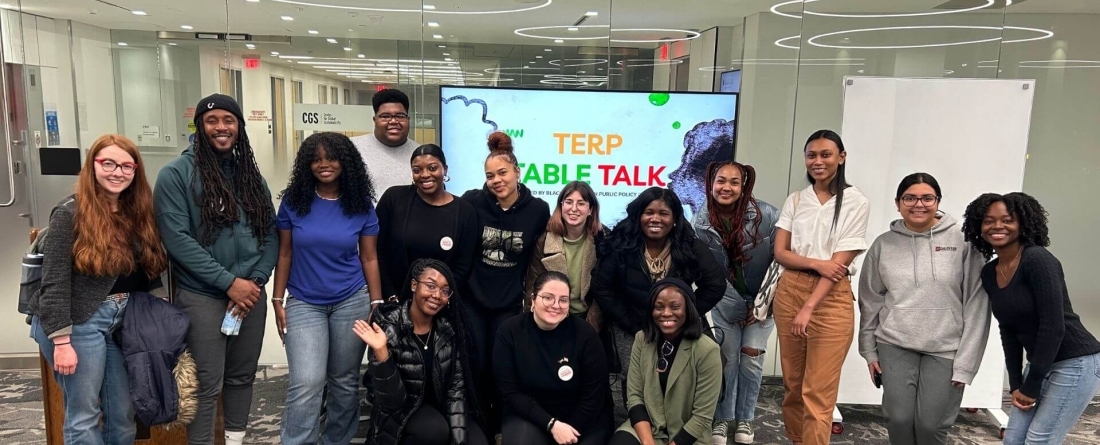
Founded in 2017, Black Students in Public Policy (BSiPP) has been fostering partnerships and collaborations with faculty and the student body. BSiPP aims to provide a safe and supportive space for Black students and students of other marginalized identities studying public policy.
BSiPP Co-presidents Laura Ndour and TaMoni Winston, and Public Relations Chair Jamal Oakman, partnered with Professor Alana Hackshaw, the School’s chief diversity and inclusion officer, to organize an enriching all-day Black History Month Teach-In. During the event, distinguished faculty members shared insights and expertise, engaging in meaningful discussions on various issues affecting the Black community.
Following a successful Teach-In, BSiPP launched their inaugural Terp Table Talk, drawing inspiration from the renowned Red Table Talk series. This event fostered an engaging and thought-provoking dialogue, focusing on cultural and political issues within the Black community. Topics ranged from navigating the origins of colorism to challenging stereotypes and perceptions surrounding Black love, as well as exploring the role of Black women in leadership and the influence of music on crime culture.
Winston opened the event by emphasizing the importance of understanding the intricate dynamics within different cultures and their implications for policymaking. She asked the audience, “How can we develop policies to help those we don’t fully understand?” She continued by sharing the goal of the event: for students and faculty to express their perspectives and personal experiences. Winston urged attendees to consider how they could serve as allies, leaders and policy advocates as they carry forward this newfound understanding beyond the event’s conclusion.
Ndour kicked off the discussion of colorism by defining the term and sharing its origins. The audience collectively acknowledged colorism’s deep roots in slavery ideology and its persistent manifestation in modern media, favoring lighter-skinned complexions. Attendees agreed that it is imperative for those favored to acknowledge and actively combat colorism and leverage their privilege to amplify marginalized voices. The group also noted that through education and breaking societal norms, communities can unite as one.
Transitioning to conversations of Black love, the hosts facilitated a dialogue on how to improve dating culture. Students and faculty agreed that systemic barriers, particularly financial challenges within the Black community, significantly narrow the dating pool. They further identified social media as a huge influence in the dating scene for all cultures, often promoting false values. The group agreed that understanding cultural dynamics and obstacles should be considered when navigating love and relationships.
The audience observed that women in leadership roles, in all races, often feel compelled to downplay their femininity or personal identity in the media to cater to their audience. Oakman shared the example of the strategic wardrobe choices of women in positions of power and in the media. The group also discussed purposeful hair choices from Black women to uphold historical “professional” dress codes. A student recounted an experience when wearing her natural hair to work prompted numerous inquiries from colleagues, suggesting something was wrong. Students and faculty emphasized the importance of representation of identity within policy spaces through intersectional lenses.
BSiPP then discussed the significance of music within Black culture, highlighting its role as many genres in America were created by African Americans. The discussion then turned to hip-hop culture, which has often been viewed with controversy and unfairly associated with crime. Traditionally, music is seen as an artistic outlet for expressing one’s self and lived experiences. The audience argued that hip-hop music does not accurately reflect the present time. While many songs depict themes of violence and crime, many argue that crime rates have been decreasing and such themes do not reflect real-life experiences. Students and faculty advocated for a return to true authenticity in music and the need for more progressive messaging that could positively influence its audience. Additionally, they emphasized the need for fair treatment of all music genres, especially given the current trend of using rap lyrics as legal evidence.
The evening concluded with a shared appreciation for the diverse cultural dynamics represented at the School. Students of different races shared their experiences and sentiments about the importance of cultural sensitivity while also sharing their stories. Students and faculty left with a new awareness of contemporary challenges in the Black community today, recognizing their broader implications. This new understanding will help to inform and shape future policy in a more equitable and inclusive way.
